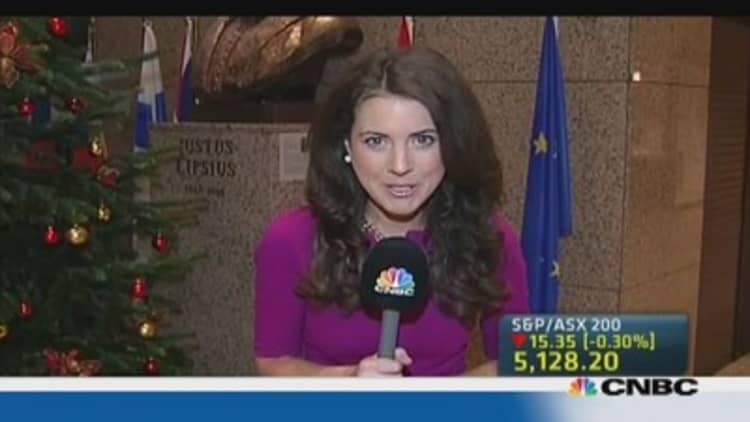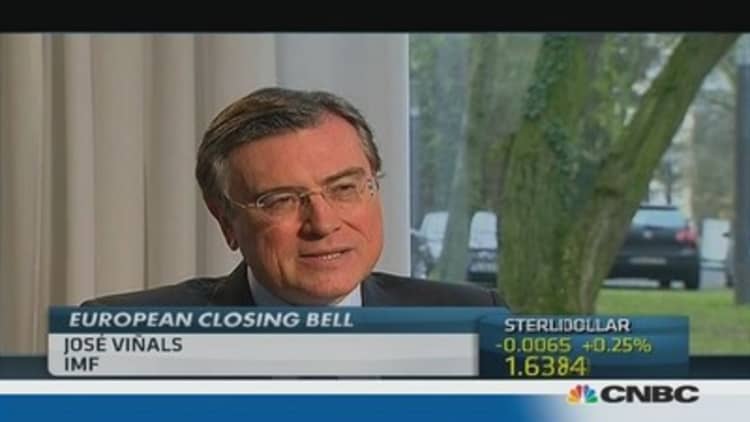
European finance ministers have reached the basis of an agreement to wind down failing banks and share the costs, Eurogroup President Jeroen Dijsselbloem told CNBC following a 16-hour marathon negotiating session in Brussels.
The agreement is expected to begin with a Cyprus-style "bail-in" process in which major depositors in failing banks are tapped first in an effort to support the lender.
(Read more: EU leaders inch closer to banking union deal)
Then, if more cash is needed, national resolution funds would be used. And if further funds are needed, these would be pooled from across the region over the next five to 10 years, forming the basis of a common fund.
"We will have a European fund as far as I'm concerned, but there will be, especially in the first years, some national responsibility," said Dijsselbloem.

"And if that causes a problem then we will have the ESM [European Stability Mechanism] according to the agreed rules. So, I think the outlines of how this will work are becoming more and more clear," he added.
(Read more: Goldman: How Europe outperforms in 2014)
In the wake of the global financial crisis, European finance ministers have been working on a plan on what do with failed banks in what is seen as a key part of a banking union. The banking union establishes new rules for bank supervision and dealing with bank failures to avoid government bailouts. It follows over three years of turmoil in the euro zone following bailouts for Greece, Ireland, Portugal and Cyprus.
Jose Vinals, International Monetary Fund Financial Counsellor and Director of the Monetary and Capital Markets Department, told CNBC that it was very important that the euro zone governments "move the financial domain in order to finish the clean-up of the banks that still have issues that need to be addressed and to advance towards the beginning of the banking union."
While Vinals said that there was "good news" in that Europe seems to be turning a corner and that "confidence is improving and capital is flowing back to the periphery," the economic recovery in the eurozone was still "weak, it is not sufficiently solid and more still needs to be done in order to make it sustained." This included making the banking union happen, he added.
Analysts say the deal is a key step towards protecting the euro zone from another crisis.
But details of the plan have proved controversial, with countries such as Germany - the euro zone's biggest economy and therefore the largest contributor to rescue efforts - opposed to a system which would see failing banks tap a euro zone rescue fund.
(Read more: Germany blamed for banking reform delays)
Other countries such as France and Spain favor a clear outline for the common fund before a deal is agreed.
Djisselbloem said the "architecture" of a common rescue fund for European banks was to be discussed in further talks -- expected to take place on Wednesday next week -- and he was confident a solution could be found before Christmas.
It was important any single resolution fund agreed upon was "credible," he added.
"I think we all want to make sure that it's credible, that the funds will be available if banks have to be resolved, but luckily we have firm bail-in rules put in place. They will take the first blow, they will deal with the first losses and then if there are more losses then we can go to the fund," he said.
Denying that the basis for the current deal failed to address the link between weak sovereigns and the banks, Dijsselbloem said that although "there will be especially in the first years some national responsibility, if that causes a problem then we have the ESM [the European Stability Mechanism - a bailout fund for struggling euro zone countries] according to the agreed rules."
— By CNBC.Com's Dhara Ranasinghe; Follow her on Twitter @DharaCNBC

